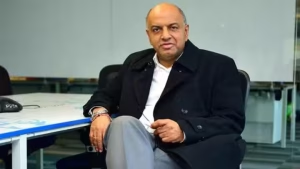
Mahmudabad’s social media post about Operation Sindoor led to his arrest.
Bikhchandani described Ashoka as “too much of a headache” in the internal email, adding that he and the other founders, Ashish Dhawan and Pramath Raj Sinha, had thought about resigning.
Ashoka University Clarifies Stance on Faculty’s Political Views Amid Arrest Row
In a recent email communication, Ashoka University co-founder Sanjeev Bikhchandani clarified the institution’s position regarding political statements made by faculty members on social media. His remarks came in response to the controversy surrounding Professor S. Y. Quraishi Mahmudabad, head of the Political Science department, who was arrested on May 18 following a social media post.
Social Media Posts Are Not Academic Scholarship
Commenting on Mahmudabad’s social media activity, Bikhchandani stated that political opinions shared on platforms like Facebook, Twitter (X), or Instagram do not constitute academic scholarship. He emphasized that:
“Any public outcry about a political opinion an academic may express on social media is not an attack on academic freedom.”
He further added that if law enforcement or government agencies take action against such posts, it should be considered a matter of freedom of speech, not academic freedom.
Ashoka University Not Obligated to Defend Personal Views
Bikhchandani made it clear that Ashoka University is not required to support or defend political opinions shared by faculty in their personal capacity. He stated:
“You are a grown-up adult. You are responsible for your actions and any consequences thereof.”
“Ashoka is not obliged to support you for political opinions. You did not seek Ashoka’s consent before posting on social media, you cannot now present Ashoka with a fait accompli and expect support.”
He stressed that individual accountability is important and that the institution cannot be held liable for personal choices made by its faculty.
Activism and Liberal Arts: A Personal Choice, Not a Mandate
Bikhchandani also addressed the broader issue of activism within academic institutions. He noted that:
“Activism at Ashoka is a choice and it does not go with the territory.”
He emphasized that a liberal arts university can maintain academic excellence without necessarily adopting an activist stance. Furthermore, Ashoka operates under the Haryana Private Universities Act and must remain compliant with legal and regulatory frameworks. This, he said, limits the university’s ability to take political or activist positions.
What Led to Professor Mahmudabad’s Arrest
The controversy erupted when Professor Mahmudabad posted on social media commenting on Operation Sindoor, a strategic military action. While he praised India’s strategic doctrine and the operation’s outcome, he also criticized the symbolic optics and the treatment of minorities. The post quickly went viral and attracted widespread criticism.
Following the backlash, two FIRs were filed against him, leading to his arrest on May 18. His detention drew national attention and sparked debates around academic and speech freedoms.
Supreme Court Grants Interim Bail
On May 21, the Supreme Court granted interim bail to Mahmudabad but declined to stay the ongoing investigation. The court emphasized that his right to freedom of expression remains protected, but also instructed that he must refrain from making public statements about the case.
Meanwhile, the National Human Rights Commission (NHRC) took suo motu cognizance of the arrest, noting a prima facie violation of civil liberties, based on media reports.